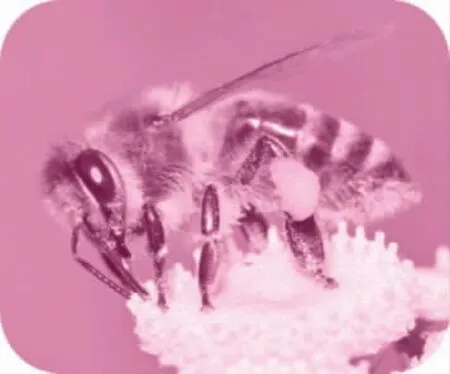“Insect Hotels” and “Bee Stops”
2020-06-17张丽

题材体裁 篇幅 建议用时345 6分钟自然生物 说明文
Bees are important for the pollination(授粉) of flowers, fruits, and vegetables. Sadly, over the past 15 years, the global population of the insects has been declining at alarming rates. So now some cities in the Netherlands are coming up with creative ideas to help stop the population decline of these allimportant insects.
In the country's capital, Amsterdam, bees can live for free in specially built “hotels”—tall wooden structures—that are scattered across the city. The corners and narrow holes within the branches provide perfect homes for members of the over 200 known species of solitary (独居的) bees. Though unable to produce honey, solitary bees are excellent pollinators.
Additionally, city officials are also educating people on the use of harmful pesticides(农药) and are encouraging developers to build green roofs or exterior walls, and populate them with local plants. In 2015, they set a goal to convert the plants in half of all public green spaces to native ones. Many citizens are also replacing the pavements outside their homes with small gardens.
Deborah Post, who lives 40 miles southwest of Amsterdam, is fighting for the cause. Post's concern for the insects started a few years ago when she noticed the honey bees in her aviary (饲养场) dying off.Upon researching further, she found out that the deaths could be attributed to several factors—the use of pesticides,invasive pests, and a shortage of food and habitat.The environmentalist realized that while there wasn't much she could do about the first two issues, she could try to restore the bees' habitat.

Post began by populating the area around her neighborhood with native plants. She also persuaded government officials and developers of a new highway near her home to replace the usual gravel(砾石) or grass along the roadside with wildflowers. Whenever possible, she tries to include school children in her projects to teach the next generation about the important role bees play in the ecosystem.Perhaps, if more countries adopted the techniques used in the Netherlands, the world would again be excited with bees.
阅读检测
1. What was done in Amsterdam with the purpose of reducing the deaths of bees?
A. Building small gardens throughout the city.
B. Growing local plants in public green spaces.
C. Prohibiting people from using harmful pesticides.
D. Building wooden structures in appointed areas.
2. What made Deborah Post directly decide to devote herself to the cause?
A. Her research on the situation of bees.
B. Her strong environmental awareness.
C. Her personal related economic loss.
D. Her desire to protect bees from threats.
3. What did Deborah Post do for bees?
A. She grew native plants in her neighborhood.
B. She reduced the use of pesticides on the farm.
C. She built a new highway lined with wildflowers.
D. She kept educating people on the benefits of bees.
4. What should be the author's opinion about Amsterdam's efforts?
A. They are limited. B. They are well accepted.
C. They are time-consuming. D. They seem to be working.
5. What is the text mainly about?
A. Measures are taken worldwide to improve bees' situation.
B. A growing number of important bees died for some reasons.
C. A woman environmentalist is making a difference to bees.
D. Amsterdam tries various means to restore the bee population.
语言学习
难句分析
Upon researching further, she found out that the deaths could be attributed to several factors—the use of pesticides, invasive pests, and a shortage of food and habitat. 经过进一步的研究, 她发现蜜蜂的死亡可以归结于几个因素——农药的使用、害虫的入侵,以及食物和栖息地的短缺。
该句为主从复合句,upon doing sth作时间状语, 意为 “一……就……”,that引导宾语从句作found out的宾语。
